The White House was under intense pressure on Friday to disclose whether any senior administration officials were aware of requests for increased diplomatic security in Libya ahead of the fatal 9/11 attack in Benghazi, following Joe Biden's insistence in the vice-presidential debate that "we weren't told".
The Republicans have gone on the offensive over Biden's remarks, claiming he misled the American people by claiming ignorance over security concerns in advance of the assault on the US consulate in Benghazi in which the ambassador Chris Stevens and three other Americans were killed. Early on in the TV debate, the vice-president said: "We weren't told they wanted more security; we did not know they wanted more security."
Jay Carney, the White House press secretary, came under repeated questioning during Friday's news briefing about what precisely Biden had meant when he made that comment. The Romney campaign has seized upon testimony given to a congressional committee the day before the debate that suggested requests for beefed-up diplomatic security had indeed been made to the Obama administration before the 11 September attack.
Carney said that Biden's "we weren't told" remark related specifically and only to the White House. "The vice-president was speaking about himself and the president and the White House. He was not referring to the administration."
Carney added that there were countless diplomatic facilities around the world and it was left to security experts in the state department to ensure adequate protection for embassy staff abroad.
In a news conference almost exclusively dominated by the Benghazi issue, Carney tried to turn the controversy back on the Republicans by accusing Republican congress members of slashing the budget for diplomatic security "in order to cut taxes for the wealthiest 2% in this country". Under the budget proposal of Paul Ryan, Romney's running mate, non-military discretionary funding would be cut by 19% by 2014, which the Obama campaign has calculated would lead to a cut of $300m in embassy security.
Carney also accused the Romney campaign of trying to "politicise this, to turn this into a campaign issue." He said: "That's a shame when we're talking about brave men and women in our diplomatic service who represent the American people."
But Carney's counter-punches are unlikely to hold back the wave of questions that the Obama administration is now facing over exactly what it knew and when about requests for extra protection in Libya before the attack. The press spokesman repeatedly side-stepped questions from reporters about whether Obama had been informed about several previous threats to attack the Benghazi consulate in the days leading up to 11 September.
"I cannot get into the specific details of a classified briefing," he said, adding "there was no actionable intelligence that suggested there would be an attack at the Benghazi facility."
As the White House tried to fight back the flames of the Benghazi controversy, leading Republicans fanned them. Newt Gingrich, a failed candidate for the Republican nomination now backing Romney, predicted on CBS television Friday morning that Biden's remarks on Benghazi would "haunt them from now until the next debate".
A senior Romney adviser, Dan Senor, questioned the administration's grasp of vital national security issues. He said Biden's comment had pointed to "the larger failures of the administration to be completely transparent about the terrorist attacks in Benghazi and the security situations leading up to the attacks."
Even before Thursday night's debate, pressure was mounting on the administration over whether it had done enough to protect US diplomatic staff in Libya. On Wednesday the congressional oversight and government reform committee was presented with a diplomatic cable sent on 2 August by Stevens to the state department in Washington asking for an additional 11 security personnel to be added to the rotation of 24. Though the 11 were to replace temporary security staff who were leaving, Stevens made clear in the cable that violence and terrorism were a threat amid a volatile political landscape.
He wrote: "Due to the level of threat in regards to crime, political violence and terrorism, post feels this is an appropriate number of LES [locally employed staff] security personnel needed to further embassy diplomatic outreach missions. Violent security incidents continue to take place due to the lack of a coherent national Libyan security force and the strength of local militias and large numbers of armed groups.
"Host national security support is lacking and cannot be depended on to provide a safe and secure environment."
The Republican-controlled committee also heard from two former US security chiefs in Libya who testified that they had found it impossible to get the message across back home that security was a critical problem.
Andrew Wood, former head of a US military team in Libya, told the committee that "the security in Benghazi was a struggle and remained a struggle throughout my time there". He added that the head of US security in the region had pushed for more people "but was never able to attain the numbers he felt comfortable with".
Eric Nordstrom, the former security chief for US diplomats in Libya, said that in his view he had been fighting a losing battle over numbers in which "we couldn't even keep what we had". Pointedly, he said that he concluded after contact with state department bosses that "we were not going to get resources until the aftermath of an incident".
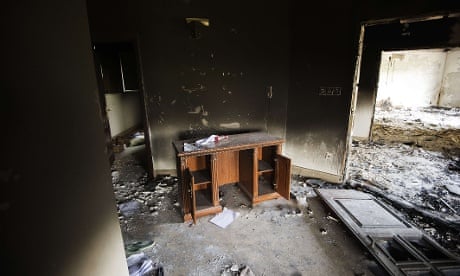
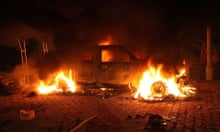
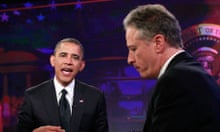

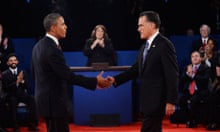

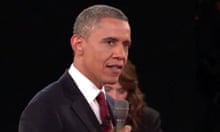

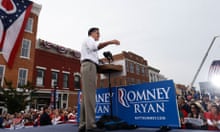
Comments (…)
Sign in or create your Guardian account to join the discussion